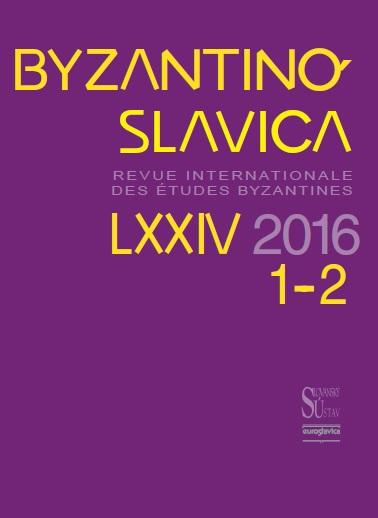Legitimizing the Rublev Trinity: Byzantine iconophile arguments in medieval Russian debates over the representation of the Divine
Legitimizing the Rublev Trinity: Byzantine iconophile arguments in medieval Russian debates over the representation of the Divine
Author(s): Ágnes KrízaSubject(s): Christian Theology and Religion, 16th Century
Published by: AV ČR - Akademie věd České republiky - Slovanský ústav and Euroslavica
Keywords: iconography of Holy Trinity;interpretation;slavonic reception
Summary/Abstract: This study analyses Joseph of Volokolamsk’s late fi fteenth-century Enlightener in which, for the fi rst time in the history of Orthodox theology, the author defends an icon of the Holy Trinity. Joseph’s apology of the visualization of the three angels hosted by Abraham at the Oak of Mamre (Genesis 18), which he interpreted as a prefi guration of the Holy Trinity, was arguably not unrelated to Andrei Rublev’s innovative Trinity icon painted at the beginning of the fi fteenth century. Defending this symbolical image of the Triune God, Joseph of Volokolamsk utilised the Slavonic translations of Byzantine arguments. The Byzantine arguments, written in favour of the representations of the Old Testament visions of God and those of the angels, mostly appear as word-for-word, but unacknowledged quotations in the text of the Russian author. The comparison of the Byzantine and Russian contexts reveals the inaccurate appropriation of Byzantine iconophile arguments by Joseph. This inaccuracy is explained by some specifi c features of the Slavonic reception of Byzantine icon theology, such as the limited Slavonic corpus of Byzantine iconophile literature and the problems of translation. The second half of the paper investigates the consequences that the imprecise Russian legitimization of the Trinitarian iconography by Joseph of Volokolamsk had for the decisions of the Hundred-Chapters Council (1551) and for the socalled Viskovaty Aff air (1553 – 1554).
Journal: Byzantinoslavica - Revue internationale des Etudes Byzantines
- Issue Year: LXXIV/2016
- Issue No: 1-2
- Page Range: 134-152
- Page Count: 19
- Language: English
- Content File-PDF

